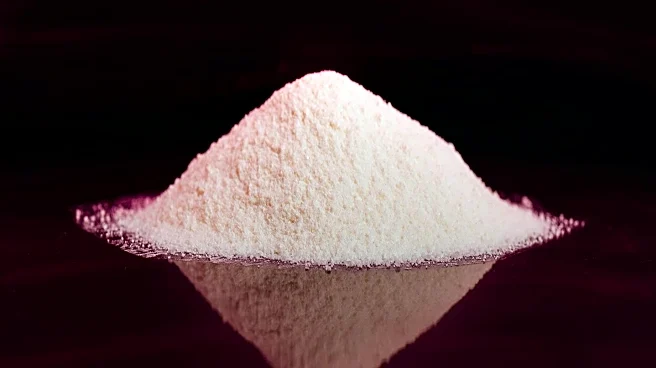What's Happening?
A recent investigation by Consumer Reports has revealed concerning levels of lead in several popular protein powders and shakes. The study involved laboratory testing of 23 different products, uncovering
widespread contamination with heavy metals, particularly lead. Plant-based protein powders were notably problematic, with nearly all tested samples showing elevated lead concentrations. Two specific products were identified as having such high lead levels that Consumer Reports advised consumers to avoid them entirely. This discovery raises significant safety concerns within the protein supplement industry, which has seen increased consumption beyond traditional bodybuilding circles into mainstream wellness culture.
Why It's Important?
The findings from Consumer Reports underscore the urgent need for stricter regulation and monitoring of protein supplements, which are increasingly popular among health-conscious consumers. The presence of heavy metals like lead poses serious health risks, particularly with long-term exposure. As the protein supplement market continues to grow, ensuring product safety is crucial to protect public health. Consumers may need to exercise greater caution and scrutiny regarding the ingredients and potential contaminants in these products. This report could prompt calls for more rigorous testing standards and regulatory oversight in the supplement industry.
What's Next?
The revelation of high lead levels in protein powders may lead to increased scrutiny from regulatory bodies and consumer advocacy groups. There could be pressure on manufacturers to improve product safety and transparency regarding ingredient sourcing and contamination risks. Health experts might advocate for more comprehensive testing protocols and clearer labeling to inform consumers about potential hazards. Additionally, this issue may drive demand for safer alternatives and innovations in the protein supplement market, as consumers seek products that align with health and safety standards.
Beyond the Headlines
The investigation highlights broader ethical and legal implications for the supplement industry, including the responsibility of manufacturers to ensure product safety and the potential for legal action from affected consumers. It also raises questions about the adequacy of current regulatory frameworks in addressing contamination issues. Long-term, this could lead to shifts in consumer behavior, with increased demand for transparency and accountability from supplement producers.










